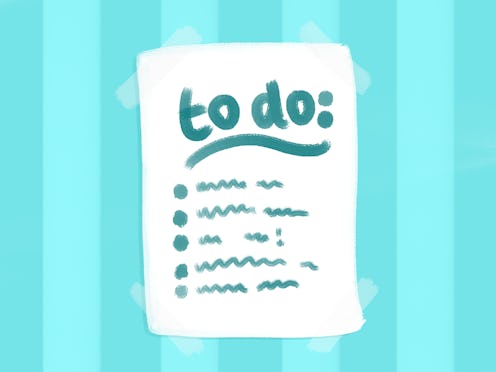
Procrastination is one of the world's worst time sucks: You have so much that you need to do, but when it comes to actually sitting down and getting it done, it seems basically impossible. But what if I told you that the opposite of procrastination, a phenomenon called pre-crastination, could be just as bad? A new study conducted by researchers from the University of Pennsylvania recently tackled the topic of pre-crastination — and it turns out that it could be a huge problem for many of us.
If you're wondering how the opposite of procrastination could be a negative thing, it's because it means we're completing tasks just for sake of completing them. Pre-crastination refers to the desire to do things immediately, but only to alleviate the anxiety surrounding leaving a particular task undone. Let me give you an example: Say that you have to respond to an email. In your hurry to get the unread email out of your inbox, you make a bunch of spelling and grammar errors in your response because you typed it out so quickly. That would be an example of pre-crastination. I know that in my own life, I like to get through the easy tasks on my to-do list first, since they can be checked off more quickly, making me feel a lot more accomplished in the process. I just thought I was prioritizing, but I now know that this is an example of pre-crastinating the easy tasks just so I could say I got them done, while simultaneously procrastinating the more tedious tasks I left at the bottom of my list.
The researchers conducted a few studies to tease out the details of pre-crastination. The first one dates back to 2013, in which college students were instructed to carry two buckets down the left and right sides of a walkway. The students could pick which bucket they thought was easier to carry and get to the end of the walkway. The researchers predicted that the students would pick the bucket that was already closer to the end of the walkway, but most picked the bucket that was closest to them at the starting point,meaning that they did more work than necessary.
When they followed up with the students to see why they chose the bucket closer to the beginning, most of them said things like, “I wanted to get the task done as soon as possible” — despite that not actually being what they did. The researchers then did a whopping nine more experiments to try to figure out why students had a tendency to choose the bucket closer to the beginning of the walkway, but failed to reach any conclusions.
Another experiment conducted with pigeons attempted to see if more could be discovered about this phenomenon. In this experiment, the pigeons had the chance to earn food by pecking a touchscreen in a certain order: First a square in the center of the screen, then a square that appeared to the left or right of the original, and finally a square with a star in it on the side of the screen. Food was given to the pigeons after the third peck, regardless as to where their second peck landed. What they found was that the pigeons adapted their behavior to move the second peck into the side square, changing up their position without having any reason to — that is, the pigeons pre-crastinated.
The discovery of pre-crastination leads to all kinds of questions about behavior and productivity. Now it seems that we have to not only worry about putting things off unnecessarily, but also doing things too quickly or completing easy tasks just so that we can get them done.
The researchers touched on this in their article, published in Scientific American and reproduced on Salon, in which they advise avoiding procrastination and pre-crastination by dividing your large tasks into smaller ones. That way, you can get through seemingly difficult tasks, but also avoid sliding through all of the simple ones first. I know that I'll definitely be more careful when it comes to how I organize my to-do list from here on out.
Images: Claire Joines/Bustle; Giphy (3)